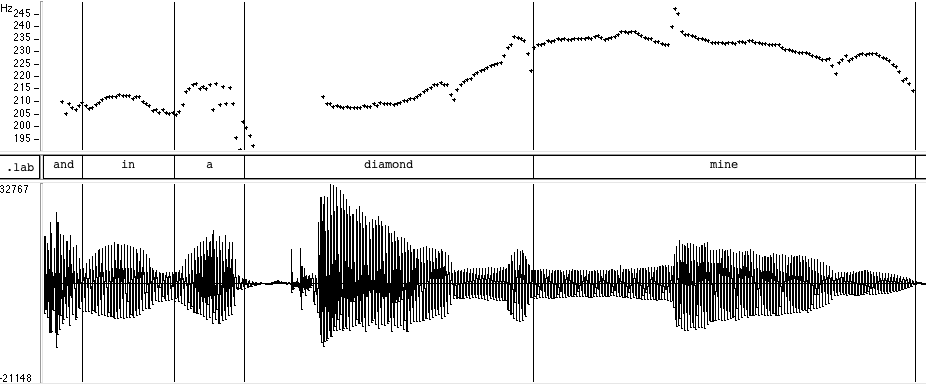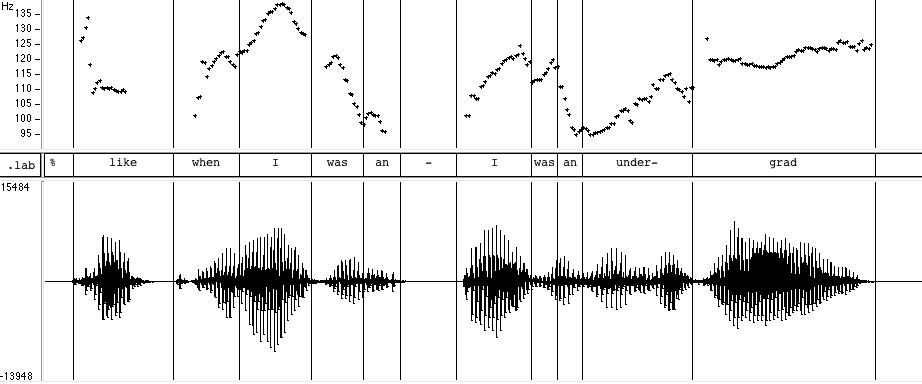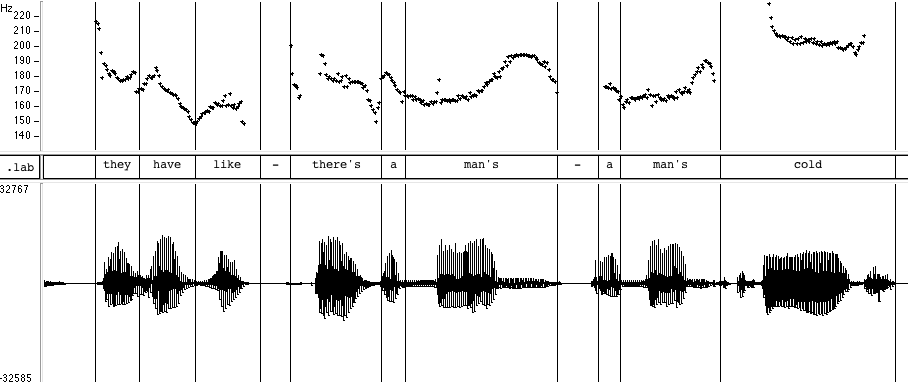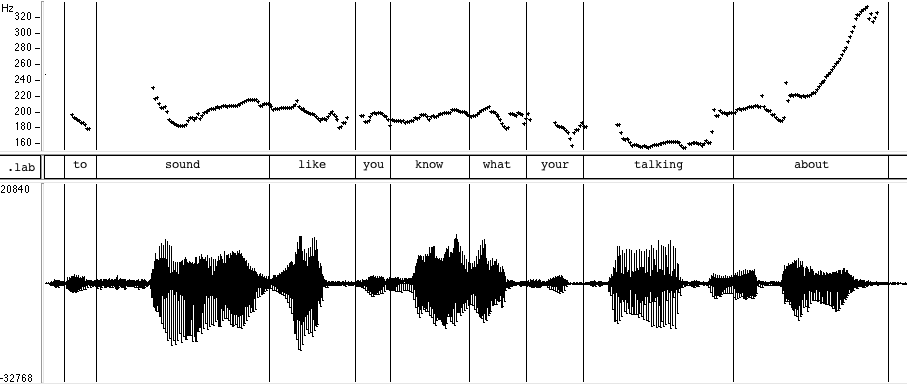The phonetics of uptalk
« previous post | next post »
In my post "Uptalk anxiety", 9/7/2008, I tried to comfort an American parent who was worried about a daughter's use of rising pitch accents on statements. As part of the recommended cognitive therapy, I observed that there are regional varieties of English, known as "Urban North British", in which rising pitch accents on statements are more common than not.
But Bob Ladd, who ought to know, commented that "It's important not to confuse the rises in Belfast, Glasgow, etc. with uptalk. They're phonetically and functionally very different."
I responded that "There's no question at all that they're *functionally* different. In terms of sound, though, I think that the issue is less clear." I asked Bob whether he thinks that the pitch contours are systematically different, and in particular whether he could "tell the difference, on short phrases whose F0 and amplitude contour was used to modulate a non-speech oscillator, in the mode of the example e.g. here?"
Bob answered: "If you make some examples, we can do the experiment, but the short answer is that I think I could as long as there is a "tail", i.e. unstressed syllables after the nucleus (last main stress) – in the sound example I posted, there are two postnuclear syllables, -mond and mine. The main phonetic difference between classic North American / Antipodean uptalk and the "Urban North British" statement rises is that the latter rise at the nuclear syllable and then level out or trail off, whereas in uptalk the pitch just keeps on rising."
We're not ready to do the experiment yet, but I can offer some evidence-based suggestions about how it's likely to turn out.
What Bob says about the "UNB statement rise" is absolutely true, as far as I know. Here's the example that he provided:
(Click on the image for a larger version.)
And you can find plenty more like this, for example in the Limmy's World of Glasgow podcasts. (These are acted stories, I believe, but apparently authentic.) Here's a sample, from Xander's story about meeting his nephew's headmaster:
And just to underline the fact that these Urban North British rises don't reflect "a psychological insecurity requesting some sort of approval or affirmation from the listener that what the talker says is correct, approved by the listener or adequately explained to the listener", here's an episode described as "John Paul noises up a taxi driver". (Warning: it's possible that the only words you'll understand will be taboo ones.)
However, Bob's statement that "in uptalk the pitch just keeps on rising" is not generally true, in my experience. Rather, uptalk usually has the same pattern that Bob describes for UNB statement rises: "rise at the nuclear [i.e. main-stressed] syllable and then level out or trail off".
You can see that in the examples that I discussed two or three years ago here and here. But the first of those was a very angry and belligerent young man, and the second one is President George W. Bush giving a speech on foreign policy; so maybe those are not characteristic examples. They're certainly not stereotypical examples, which was really my point — like UNB statement rises, American uptalk is not necessarily (or even usually) polite and deferential, nor indicative of uncertainty, nor used only by young people.
But maybe if we found some really typical uptalk, it would have final rises that just keep on rising, no matter how many post-nuclear syllables there are. So for this morning's Breakfast Experiment™, I listened to some random conversations from an LDC collection published in 2004.
In Limmy's Glasgow podcasts, nearly all the episodes have frequent rising nuclear accents in statements, but in the American conversations, I had to listen to (fragments of) four or five conversations before I found the first extended uptalking passage, produced by a 22-year-old male speaker from Minnesota:
Here's the audio and pitch contour for the first phrase alone:
The second uptalking passage that I found was produced by a 27-year-old woman born in Canada but living in Wisconsin:
Again, here's the audio and pitch contour for a short phrase with a bit of an intonational tail to look at:
These two examples are consistent with my impression that North American uptalk generally involve a rising nuclear accent (that is, a rise on or just after the last strong stress in the phrase), but a "tail" that is generally level or even slightly falling.
On the other hand, maybe there's another kind of American uptalk, or another class of American uptalkers, that has the properties that Bob describes. For an idea of what that might be like, we can turn again to Taylor Mali's uptalk imitation:
In case you hadn't realized
it has somehow become uncool
to sound like you know what you're talking about?
The first two phrases have exactly the sort of pattern that we've been talking about, but the pitch contour of the last phrase of that sentence looks like this:
Mali has the rising nuclear accent on "talking", but he ends with a boundary-linked rise on the last syllable of "about".
However, this is a performance by someone who is not a native uptalker, and is trying to satirize uptalk, which he believes is a kind of (yes/no) question intonation. So maybe he's actually producing a question intonation, because that's how he (mis-) hears uptalk.
Then again, maybe this is a stronger or more emphatic or geographically distinct form of uptalk — I don't know. Unfortunately, I don't think that anyone else knows either. (Though the examples documented here, e.g. this one, add some credence to the "stronger or more emphatic" theory…)
But I do know that it's going to be hard to distinguish Urban North British statement rises from North American uptalk, overall, just on the basis of pitch contours. And in particular, Bob's idea (that we can do it purely on the basis of whether post-nuclear syllables "just keep on rising") is not going to work.
I've always thought that North American uptalk might have Scots-Irish roots, although I've got no real evidence for this belief. The idea came up when Cindie McLemore pointed out, many years ago, that uptalk was endemic among elderly men calling in to a Toronto radio talk show about hockey. I don't know whether rising-accented statements were preserved in other North American regions with a significant Scots-Irish population; nor do I know how or why this might have played a role in the spread of "uptalk" among other groups in the 1970s and 1980s. Maybe it was Sunbelt migration patterns; maybe it was a random memetic twitch; maybe the whole idea is wrong.
[By the way, my reason for agreeing that the UNB statement rises are functionally different from North American uptalk is not anyone's theory of what the function of either pattern is — it's simply statistical. Work by Grabe et al. suggests that in some British speech communities, the great majority of all statements have final rises. As far as I know, there are no American speech communities where this is true — uptalk remains more limited and more marked, and this guarantees that its communicative effect must generally be different. But in fact we know very little about who uses uptalk when and why, because despite all the discussion of this phenomenon in the literature, no one (as far as I know) has systematically annotated instances of uptalk in a published corpus of natural North American speech.]




Melissa K Fox said,
September 13, 2008 @ 8:46 am
American uptalk is not necessarily (or even usually) polite and deferential, nor indicative of uncertainty, nor used only by young people.
Nor new. My father was certainly on my case about it when I was about twelve (which was before I remember the phrase "get off my case" turning up in my peer group's inventory, incidentally), and we must have picked it up from older kids and ultimately from television — this was the 80's, after all, the golden age of putting teenagers in half-hour sitcoms. I saw the article in the Washington Post a bit before your initial post on this subject, and I confess I was baffled — why are people fretting about this now? (Linguistic analysis is not fretting, of course, but hand-wringing in the Post sure is.) (I see you refer to "the spread of uptalk among other groups in the 1970s and 1980s", so I am slightly calmed w/r/t the recency illusion as well.)
Mark Liberman said,
September 13, 2008 @ 9:57 am
Melissa K Fox: I saw the article in the Washington Post a bit before your initial post on this subject, and I confess I was baffled — why are people fretting about this now?
I missed this article. A search of the WaPo site for "uptalk" comes up empty. Link?
Sandy Ritchie said,
September 13, 2008 @ 12:18 pm
The best British satirisation of this phenomenon is undoubtedly to be found in Chris Morris' and Charlie Brooker's briliant Nathan Barley (Channel 4, 2005); examples are littered throughout the show but just to whet your appetite watch this little scene where a meeting quickly descends into idiocy (start at 2:45, and keep watching!)
uk.youtube.com/watch?v=twBfizoviBg&NR=1
Joe said,
September 13, 2008 @ 2:05 pm
Why does both this story and the one about illeism remind me of Japanese? After reading so much about the accent nucleus and Japanese pitch accents in the hopes of being able to duplicate them, it seems almost like some of what you're describing would be normal in Japanese…
David Beaver said,
September 13, 2008 @ 2:39 pm
I remember some work on this that you (Mark) and Bob are probably familiar with:
Intonational variation in four dialects of English: the high rising tune, J Fletcher, E Grabe, P Warren, in Jun, S.A. (ed) Prosodic Typology: The Phonology of Intonation and Phrasing, 2004, OUP.
I don't remember a controlled experiment, however.
David
David Marjanović said,
September 13, 2008 @ 3:58 pm
That is one disturbing video.
Mei French said,
September 13, 2008 @ 10:30 pm
I've always known this phenomenon as a 'rising inflection', for some reason. To my knowledge, it's common in Australia, and has been for at least 20 years, particularly amongst teenage girls (and possibly boys, but I do teach at a girls' school). The rising inflection is very similar to Taylor Mali's imitation, although the rising pitch could be more frequent – at the end of every phrase. Although I find it incredibly annoying, when I hear my ESL students use it in oral presentations, at least I know they are developing native-like speech.
I couldn't find any genuine examples but old comedy character Kylie Mole does a pretty good job: http://www.youtube.com/watch?v=OXhmL8XZcFM
And comedian Adam Hills gives it a go: http://www.youtube.com/watch?v=KpBYnL5fAXE&feature=related
Stuart said,
September 13, 2008 @ 11:03 pm
Urban North British rises don't reflect "a psychological insecurity requesting some sort of approval or affirmation from the listener that what the talker says is correct, approved by the listener or adequately explained to the listener"
I found Glaswegian taxi driver surprisingly easy to understand, and definitely not insecure, even though he had a sadly limited vocabulary.
[(myl) Perhaps not so easy to understand after all — he's not a taxi driver, he was describing his interaction with a taxi driver.]
Where does ANZAC uptalk fit in to the range of this phenomenon? How different is it from the Urban North British, and from the North American version which prompted this discussion?
[(myl) The "Antipodean rises" are extensively discussed in the literature. I don't think that they're the same as American uptalk, either functionally or phonetically, but frankly the facts have been sadly muddled by a range of inaccurate descriptions associated with the term "high rising terminal".]
I guess that if you have spoken that way your whole life, and been surrounded by others doing likewise, the notion that there's something awry with it is hard to grasp.
[(myl) In that situation, in what sense is anything awry?]
Stuart said,
September 14, 2008 @ 7:21 pm
"[(myl) Perhaps not so easy to understand after all — he's not a taxi driver, he was describing his interaction with a taxi driver.]"
Blame my latent reluctance to believe a Pope capable of such convincincingly earthy Glaswegian profanity. I knew that the speaker was supposed to be the pope, but he just sounded much more like a cabbie than a cardinal.
As for the "awry" comment, that was in reference to the general tenor of many remarks by North American commenters.
polysyllabic said,
September 17, 2008 @ 6:11 pm
I don't blame Elmo…
At Language Log, Arnold Zwicky has a post on illeism, which I found personally relevant, as my son Aran is 3, and I find myself frequently using appa (the Tamil word for father) to refer to myself ("Appa will get you juice," etc.).
I adopted the hab…
Irene said,
September 18, 2008 @ 3:31 pm
Poly Syllabic commented on Zwicky's post about illeism in children. I also wanted to comment on this and I don't understand why comments are closed on some posts.
Years ago my little next door neighbor, about 3 years old at the time, kept asking me where my daddy was. Being an adult, I though it was odd that the girl wanted to know where my father was until her mother explained to me that to her daughter, daddy meant the man of the house. So, she was really asking me where my husband was.
This child generalized from her daddy (her father and the daddy of her house) to a daddy of any house. She understood that daddy was what her father was, not who he was.
Meghan said,
December 26, 2008 @ 1:02 pm
Hi Mark,
To my ears, what Mali produces does not sound like what I consider to be traditional American English uptalk. I feel like specifically the pitch contour ("to sound like you know what you're talking about") on this post has a different functional meaning than typical American English up talk or yes-no questions – in my opinion this is a contour that we might find used in a talk or a lecture – or maybe even by preachers, where the contour seems to reflect an epistemic judgment by the speaker about the QUD, but at the same time seeks the interlocutors' confirmation that the speaker's judgment is indeed correct. So in effect, instead of reproducing uptalk it seems like Mali is using another rising contour that reflects his feelings of disdain for uptalk…
This is incredibly speculative but that's just how the contour sounds to me.
With respect to the markedness of uptalk, I have been working on the acquisition of nuclear stress in yes-no questions for L2 English speakers (grad students living in the U.S. for at least 4 years) whose L1 is Peninsular Spanish – I've been finding this generally level tail in their yes-no question production. I'm not at liberty to say whether this is from interference or uptalk, but it has made me think more about the salience of uptalk in general.
It's been great to see all these uptalk posts!